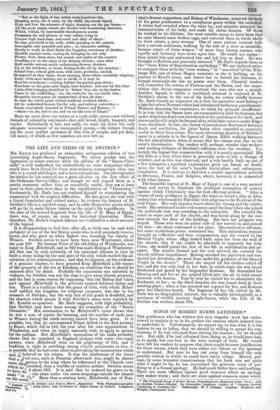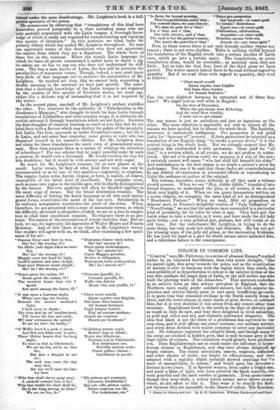SONGS OF ROBERT BURNS LATINIZED.*
THE gentleman who has written this very singular work has endea- voured to explain to us in his preface the reasons which induced him to undertake it. Unfortunately, we cannot say to him what it is the fashion to say to ladies, that we should be willing to accept his con- clusions, if he had refrained from stating his reasons ; for we should not. But still, if he had refrained from doing so, he would have had, so to speak, but one foot in the mire instead of both. He would have left his readers to suppose that there might be some justification for these verses, which they were either too obtuse or too ignorant to understand. But now he has cut away from himself the only possible retreat in which he could have taken refuge. Moved, per- haps, by some transient consciousness that his book was not quite what it ought to be, he has committed the grievous error of pre- fixing to it a formal apology. He had much better have said nothing. There are some offences against good manners which an apology only makes worse ; and there are some against common sense which • The Principal Bongs of Robert Burns, Translated into Medieval Latin Verse ; with the Scottish Version Collated. By Alexander Leighton, Author of "Curious Storied Traditions of Scottish Life." Edinburgh: W. P. Nimmo. London: lioulston and Wright, Paternoster Row. labour under the same disadvantage. Mr. Leighton's book is a full- grown specimen of the genus. He commences by observing that "translations of this kind have heretofore proved acceptable to a class including many who are only partially acquainted with the Latin tongue, a thorough know- ledge of which is really not required for comprehending and enjoying this species of literature." In this sentence we think lurks the primary fallacy which has misled Mr. Leighton throughout. No man can appreciate verses of this description who does not appreciate the canons from which they are a departure. The whole force of them lies in the contrast. When the stately Latin language to which we have all grown accustomed is called upon to dance a its antics are no fun to any one who does not understand its stiff- ness. The less a man knows of Latin, the less will he perceive the peculiarities of macaronic verses. Though, indeed, a man must know very little of that language not to perceive the peculiarities of Mr. Leighton. So marked are they, that we cannot help suspecting a double meaning in the sentence we have just quoted. The asser- tion that a thorough knowledge of the Latin tongue is not required by the readers of this species of literature seems, we must say, rather like a delicate way of insinuating that it is not required by the writer.
In the second place, one-half of Mr. Leighton's preface stultifies the other. For, whatever be the authority of "Paterfamilias in the Gentleman's Magazine," who thought to teach his boys Latin through translations of Lillibullero and other popular songs, it is obviously ab- surd to attempt it through translations which are not Latin. Sweeten the first draughts of classical learning as much as you like, but do not taint them with a flavour which may destroy the palate of the neophyte. Let Latin, like love, approach us under friendship's name ; but let it be Latin, and not some base impostor, some groom or valet who has disguised himself in his master's clothes. Yet Mr. Leighton does not claim for these translations the merit even of grammatical accu- racy. How then propose them as a means of winning the attention of schoolboys ? For one scholar that he might possibly make by such a process, he would ruin a thousand. He would sweeten his cup for him doubtless; but it would be with arsenic and not with sugar. So much for Mr. Leighton's reasons ; let us now glance at the result. Latin verses, be they of what kind they may, can only be recommended to us by one of two qualities—ingenuity, or elegance. The regular Latin verse, heroic, elegiac, or lyric, is mainly, of course, susceptible of the latter kind of excellence. The irregular verse, such as came into vogue in the middle ages, will bechietly distinguished by the former. The two qualities will often be blended together in the same copy of verses. But the broad distinction remains. The mere difficulty of forcing the Latin language at all into such uncon- genial forms, constitutes the merit of the -one sort. Scholarship in its ordinary acceptation constitutes the merit of the other. When, therefore, we are presented with a copy of macaronic verses, in which the difficulty aforesaid is altogether evaded, we are at a loss to conjec- ture in what their excellence consists. To elegance there is no pre- tence. The nature of the composition of course excludes that. But we look, we say, for ingenuity: the ingenuity of Walter Mapes and Francis Mahoney. And of this there is no trace in Mr. Leighton's verses. Our readers will agree with us, we think, after examining a few speci- mens of his art :
"Duncan Gray cam' here to woo, "Dnneanns Canns venit nobis, Ha! ha! the wooing o't 1 Hal ha! amores hi !
• On blithe yule night when we were Festn 4num inebriabamus, fon, Ha! ha! amore.s hi !
Ha! ha! the wooing o't I Caput Maggea jactabat, Maggie coost her head fu' high, Oculos et obliquabat, Look'd asklent and unco skeigh, Duneannm fastu pertractabat,
Gait poor Duncan stand abeigh ; Ha! ha! amonss hi !" Ha! ha! the wooing o't !"
"Green grow the rashes, 01 Green grow the rashes, 0!
The sweetest hours that e'er I spend, Are spent amang the lasses, 0."
"It was upon a Laminas night, When corn rigs are bonnie, Beneath the moon's unclouded light, I hied away to Annie : The time flew by wi' tentless heed, Till 'tween the late and early, Wi' ems' persuasion she agreed To see me thin' the barley."
"0 Willie brew'd a peck o' maut, And Rob and Allan cam' to pree ; Three blither hearts that lee-lang night/ Ye wad na find in Christendie. We are us foe, we're na that foe, But just a drappie in our e'e ; The cock may craw, the day may daw, An' aye well taste the bar- ley bree.
"Wits first shall rise to gang awa', A cuckold coward loon is he ! Wha last beside his chair shall fa', He is the king amang us three ! We are na fou, "Crescent juncilli, 0; Crescant juncilli, 0; Nulls vita dukior Quam vita cam puellis, 0."
" Clara nocte sextili, Quinn segetes aunt falgidie, Sub lume clam lumine Ad Annam festinavi Fugit tempts furtive, Gag' ad noctem rnadiam ; Annuit me comitem Ducere per hordetnn."
"Gnlielmns pottun coxit, Robert' ergo et Allani : Noetu ties hilariores, Fuerunt non in Christandie. Non inebriamnr nos, Scintilla tantum oculo: Canat gallus—luceat : Lfetabimur in poculo.
"tile primus qui exsurget, Cuccurra timidissime ! Qui sub sells primus cadet, Trium nostrum rex Hie.
Nos inebriamur, etc." "Is there, for honest poverty, "Estne pro pauperiem
That hangs his head, and a' that ; Qui langueat—et mane quid
The-coward-slave, we pass him by, Te timide! dimittimns
We dare be poor for a' that ! Egeni nos—et omne quid.
For a' that, and a' that, Nibilominus, iaihilominus, Our toils obscure, and a' that, Angustite—et omne quid. The rank is but the guinea's stamp, Notatum aurum Ordo est, The man's the gowd for a' that." Aurum vir—per omne quid."
Now, in these verses there is not only literally neither rhyme nor reason; there is not even rhythm. There is nothing visible beyond the translation of the English words into a certain number of Latin ones, which go into a certain space. The translations, as prose translations alone, would be execrable ; as metrical ones, they are futile. Let us take the first four lines of the third piece we have quoted. The writer cannot intend them to be read without regard to quantity. But if we read them with regard to quantity, they read as follows :
"Clara noct sextali
Quum segetes aunt fulgid' ea Sub lime claro lumina Ad Armam festintivi."
Can the very slightest harmony be extracted out of these four lines? We might just as well write in English :
On the first of December, When the gas-lamps were flickering, And the wind blew terribly, I went out to get supper.
The one stanza is just as melodious and just as ingenious as the other. The same objection is applicable not only to almost all the stanzas we have quoted, bat to almost the whole book. The Latinity, moreover, is excessively ambiguous. Pro pauperiem is not good Latin for "because of" poverty. lffestu pertraetare be intended as a translation of our English slang "to stroke a person down," it is the neatest thing in the whole book. But we strongly suspect that Mr. Leighton has confounded it with pertentare. Ovine quid for "all that," is a version which, at all events, we do not profess to under- stand. Qui sub sella pi-joins cadet, we suppose, is a slip of the pen: it certainly cannot well mean " wha last shall fall beneath his chair." And inebriabamus in the first stanza is no doubt a printer's error for inebriamur. Nor can it be said that these faults are counterbalanced by any felicity of expression or successful efforts at reproducing in Latin the archness or pathos of the original.
The volume, therefore, seems deficient in all that such a volume should possess. When we see "Hey, diddle diddle," translated into formal elegiacs, we understand the joke, at all events, if we do not think very highly of it. When we see grave hexameters written on a comic subject, we recognize the same kind of wit as distinguished " Bombastes Furioso." When we read, 3fihi sit proposilum in iabernd mori, or Prouts's delightful version of "Judy Callaghan" or "Nora Creina," we see that the authors have succeeded in a particular kind of jocularity, let its value be what it may. They have got the Latin muse to take a tumbler, as it were, and have made the old lady quite frisky : not a very polished jest, perhaps, but still venial at an odd time. But the unfortunate Mr. Leighton, in trying to do the same thing, has only made her sulky and obstinate. He has not got the winning ways of the jolly old priest, or the insinuating Irishman. He has tried his hand at a part for which nature never intended him, and a ridiculous failure is the consequence.































 Previous page
Previous page